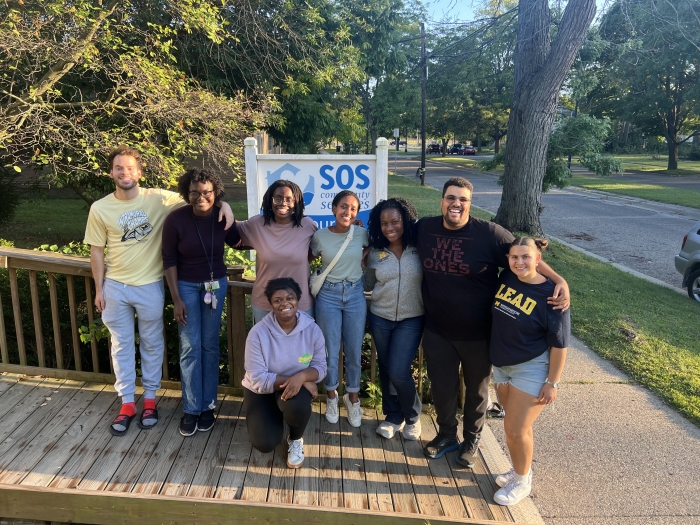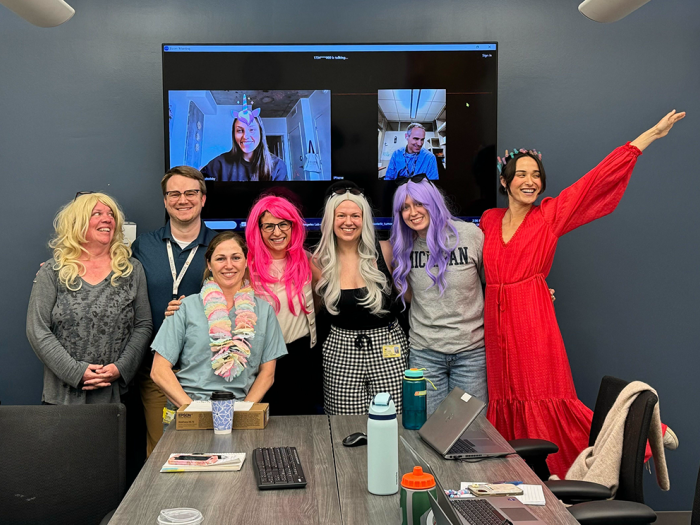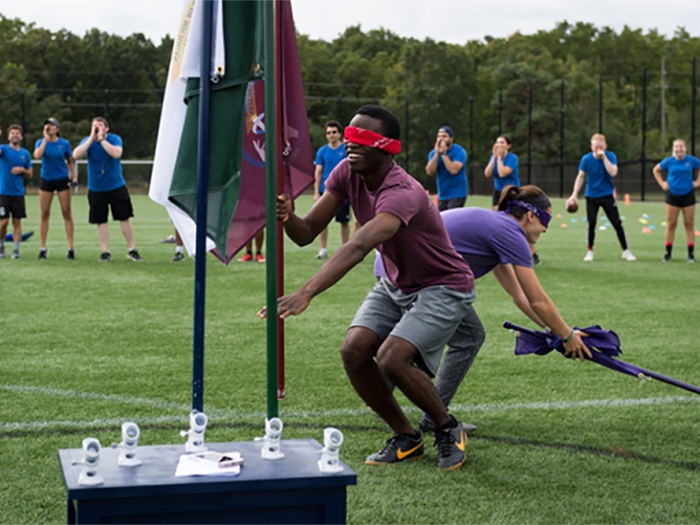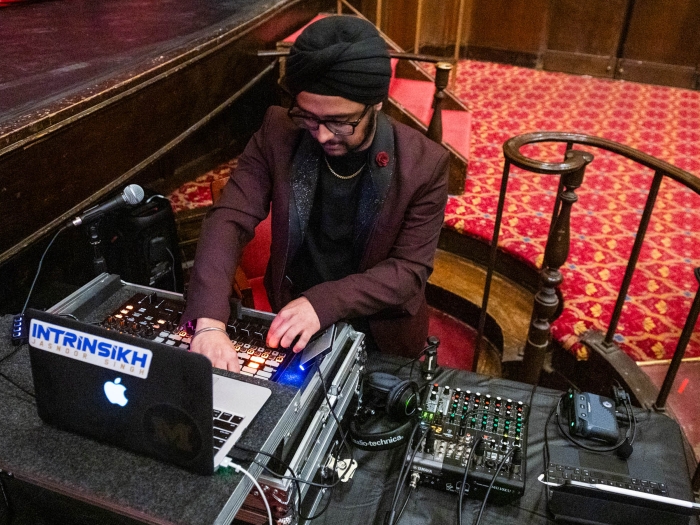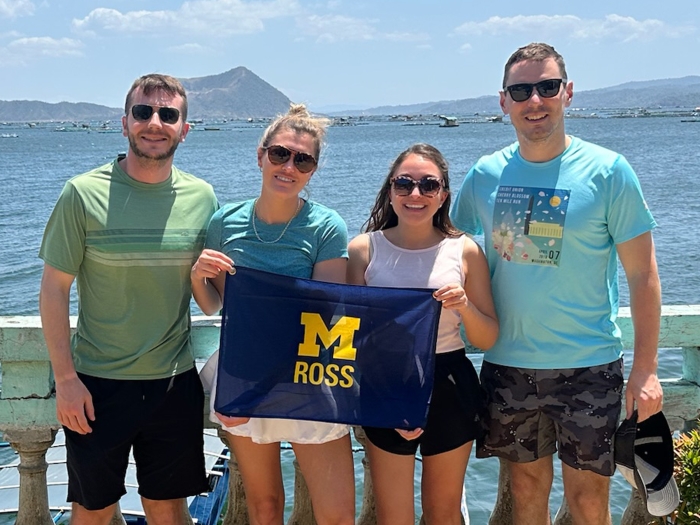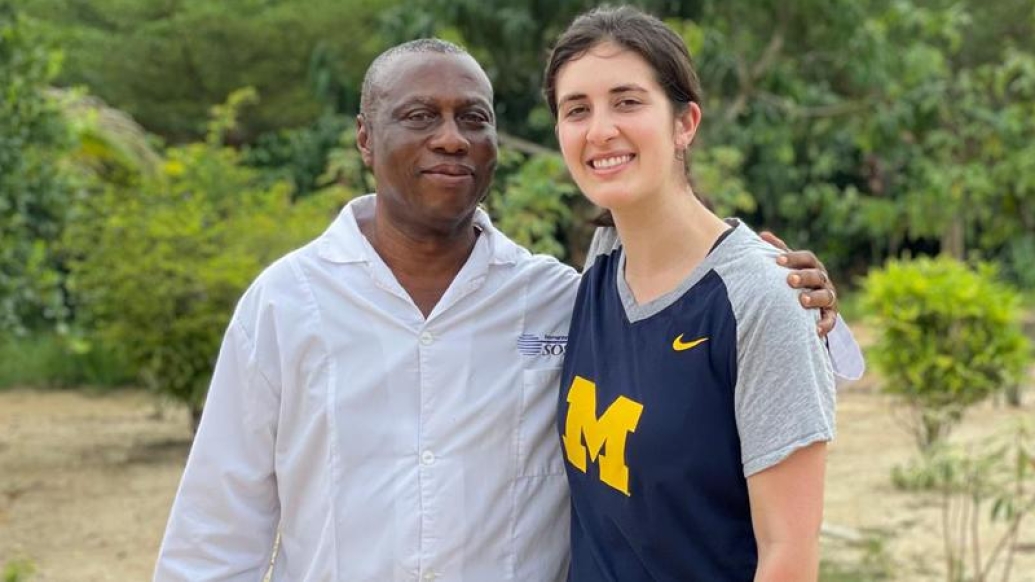
Kate's Michigan Answer: Michigan attracts people who truly care about mentorship, collaboration, and innovation. With this supportive community by my side, I knew that I could make the most of my four years in medical school at Michigan.
Kate Panzer (she/her/hers) started her journey on a service learning course for pediatric tuberculosis in Ghana, where she also conducted rural health research with a nonprofit organization, making lifelong connections that continue to motivate her engagement in global health efforts. Through the mentorship of multiple Michigan Medicine faculty members, and collaborating with a multitude of university peers, Kate has been able to explore her passion for helping the Deaf and hard of hearing community, as well as founding and participating in a number of student organizations.
While participating in training such as the MDisability Summer Internship Program and the Global Health and Disparities Path of Excellence, Kate found that her classmates are part of what makes Michigan so special, and feels constantly inspired by their community impacts to shape her own aspirations. Through her passion for dancing, she has found the connections made through extracurricular activities such as Biorhythms are just as important as connections made inside the classroom.
Why did you decide to attend Michigan?
In 2019-2020, I participated in the MDisability Summer Internship Program and completed a gap year conducting disability health research through MDisability at Michigan Medicine. Prior to that year, I was unfamiliar with Michigan and all the university had to offer. My experiences working with faculty, staff, and students showed me that Michigan attracts people who truly care about mentorship, collaboration, and innovation. With this supportive community by my side, I knew that I could make the most of my four years in medical school at Michigan.
What have been your favorite parts or features of the med school curriculum so far, and why?
My absolute favorite part of the med school curriculum at Michigan is its flexibility, particularly during the third and fourth year (known as the “Branches”). Since we complete our core clinical clerkships in the second year of medical school, we have the freedom to explore specialties, study for our medical licensing exams (Step 1 and 2), and schedule a few weeks of vacation throughout our third and fourth year. I have loved this flexibility to create a unique path on my own timeline.
What is your Path of Excellence, why did you choose to pursue a path, and what have you enjoyed most about taking part in a Path?
With my interests in disability and global health, the Global Health and Disparities Path of Excellence was the best fit for me! I decided to choose a path because I wanted to learn more about global and domestic health disparities beyond topics that were already familiar to me, and the path has certainly broadened my view of what can be achieved as a medical student and health professional in this space. My peers are doing impactful work in areas they are most passionate about, and I love learning from them while gaining inspiration for my own initiatives in disability health and global surgery.
How have your experiences at Michigan led you to choose your specialty for residency and what advice do you have around choosing a specialty?
During my gap year at Michigan, I had the privilege to work with several faculty members who are national leaders in disability health. Drs. Michael McKee and Philip Zazove taught me about partnering with Deaf and hard of hearing patients through the Deaf Health Clinic, while Dr. Oluwaferanmi Okanlami welcomed me into the inclusive world of adaptive sports and fitness. This exposure encouraged me to consider specialties that would allow me to work closely with patients with disabilities. On my surgery clerkship and orthopaedic surgery elective in my second and third year of medical school, respectively, I found a love and appreciation for surgery, where hours fly by in the operating room and I feel a strong desire to contribute in any way that I can. Additional time in the clinic showed me the incredible impact that orthopaedic management can have on patients’ wellbeing and quality of life. With my interest in surgery, passion for disability health, and background in bioengineering, I realized that orthopaedic surgery was the perfect specialty to combine all the things that I love about medicine.
When trying to choose a specialty, my biggest advice would be to keep an open mind, go with your gut, and consider what patient population most motivates you. By the first few weeks of a clinical rotation, you will have a general sense of whether you find joy and energy in what you’re doing or if you feel drained. Further explore the specialty(ies) that energize and make you excited about engaging with your patients each day. Shadowing early in undergrad and the first/second year of medical school also gives you a sense of the culture and environment in different specialties, which can be helpful.
Share the health disparities, health equity and/or social justice work you’ve become involved in at Michigan.
In undergrad, I took four semesters of American Sign Language (ASL) and became passionate about working with the Deaf and hard of hearing community. My gap year at Michigan expanded this interest to partnering with the disability community more broadly. However, when I started medical school in 2020, Michigan did not have a student group dedicated to disability advocacy. Thus, as a first-year medical student (M1), I collaborated with Alexa Minc (an M4 at the time) to create Medical Students for Disability Health & Advocacy (MSDHA). This organization includes students from all four classes and aims to educate the medical school community on disability health topics while cultivating community among medical students with disabilities and chronic illnesses and allies. I also had the opportunity to collaborate with faculty, medical ASL interpreters, and an ASL instructor to develop an ASL Elective for Medical Students. This elective had been a dream of mine throughout undergrad, and I feel very lucky to have a dedicated team and resources to introduce medical students to basic ASL and Deaf culture so they can be better prepared to communicate with their Deaf patients.
Share the research activity(ies) you’ve become involved in at Michigan.
Research opportunities and mentorship abound at Michigan! On my orthopaedic surgery rotation, I worked with Dr. Jaimo Ahn, a clinician-scientist within the department. Dr. Ahn is vocal about encouraging learners to develop their own research questions and has mentored countless medical students and residents. While on the orthopaedic trauma team, I helped care for a patient with a lower extremity amputation who underwent surgery for a femur fracture. One morning, the patient asked us when he could expect to walk with his prosthesis again, and our team didn’t have a clear answer for him. This question inspired me to develop a research study on outcomes for patients with lower extremity amputations after femur fractures. I also teamed up with three underclassmen who share an interest in disability and orthopaedic surgery. With Dr. Ahn’s mentorship and the research resources available at Michigan, I learned how to develop my own research protocol, lead a team of peers, and bring an idea from conception to implementation. This experience has motivated me to pursue future clinical research and ultimately strengthen best practices in orthopaedic surgery for patients with disabilities.
Share the global health opportunities you’ve had while training at Michigan.
My interest in global health began in undergrad, where I participated and student-led a service learning course on point-of-care diagnostic devices for pediatric tuberculosis in Ghana. This exposure led me to pursue a gap year in Tarkwa Breman, Ghana, where I conducted rural health research with a nonprofit called Cocoa360. By the end of the year, I had been adopted by several Cocoa360 staff members and families in the community to the point where Tarkwa Breman became my home away from home. These lifelong connections are what motivate me to engage in global health efforts, particularly in Ghana, and I couldn’t wait to make the most of Michigan's incredible partnerships in Ghana.
While starting medical school during the peak of COVID, my dream of collaborating in Ghana during medical school began to fade. However, as the vaccine became available and travel started to pick up, I began to hear stories about upperclassmen participating in international electives. These stories encouraged me to reach out to faculty in the Global Health and Disparities (GHD) Path of Excellence, which ultimately led me to contact Dr. Gifty Kwakye -- a colorectal surgeon at Michigan Medicine. It turned out that Dr. Kwakye was in the midst of developing the first colorectal surgery fellowship in Ghana and was planning a trip to Accra (the capital of Ghana) in the coming months. She was eager to include me in these efforts and advised me on developing a capacity assessment of Korle Bu Teaching Hospital in supporting the needs of the colorectal surgery fellowship. After a few months of preparation, we flew to Accra, where we worked with Ghanaian general surgeons through anatomy dissections, strategic meetings, and a full day of colorectal surgeries in the operating room. With the knowledge and experience that I gained in Ghana, I’m currently working on a manuscript for the hospital capacity assessment and plan to submit this work for my Path of Excellence project.
This hands-on experience in global surgery was far beyond what I could have imagined prior to starting medical school. The mentorship from Dr. Kwakye, Dr. Bediako-Bowan from the University of Ghana, and GHD faculty has been unparalleled, and I am deeply thankful for the financial support from Global REACH and the Capstone for Impact grant. My time in Ghana has taught me invaluable lessons on the importance of genuine connection, communication, and collaboration with partners across countries and cultures to ultimately achieve a common goal. My hope is to build on this foundational experience to further advance surgical education and capacity building in Ghana and apply what I have learned to the field of orthopaedic surgery.
What do you like to do in your free time?
I absolutely love to dance (salsa, bachata, afrobeats, hiphop, tap, etc.) and have been pleasantly surprised by the flourishing dance scene in Southeast Michigan. There are several dance studios in and around Ann Arbor that host weekly salsa and bachata classes/socials, and I drive to Detroit monthly for afrobeats class at Detroit Dance Loft (shout out to directors Marc and Rose). We are also incredibly lucky at Michigan to have our own medical school dance group called Biorhythms. As a Biorhythms co-director, choreographer, and dancer, I help to put on two productions each year and enjoy getting to know peers from all four medical school classes through our mutual love of dance!
What activity(ies) have you most enjoyed being able to do in the State of Michigan?
Coming from the Philadelphia area, it’s been so much fun to explore everything Michigan has to offer! My most memorable trips have been traversing Sleeping Bear Dunes, camping in Saugatuck, kayaking along Pictured Rocks, and biking around Mackinac Island. Other favorite activities around Ann Arbor include tubing down the Huron River, savoring apple cider donuts at the Dexter Cider Mill, and running around Gallop Park.
What comes to mind when you think of your fellow students at Michigan, and how have they shaped your med school experience in big and small ways?
My classmates are a big part of what makes Michigan so special. They are passionate and driven while also being down to earth and fun to be around. I am constantly blown away by the impact they have on communities they care most about, and their ideas often shape the ways I think about my own aspirations and goals. For instance, Medical Students for Disability Health & Advocacy and the Medical ASL elective came about by connecting with an upperclassman who had a similar interest in ASL. Additionally, my motivation to pursue an opportunity in global surgery was renewed after speaking with another upperclassman who had created their own clinical elective in Brazil. Through Biorhythms, I’ve made like-minded friends who encourage me to find balance and joy outside of the clinical space. All of my classmates have something special to offer to our med school community, and I’m thankful that we get to learn and grow together.

Associate Professor

Clinical Professor Emeritus/a

Assistant Dean

